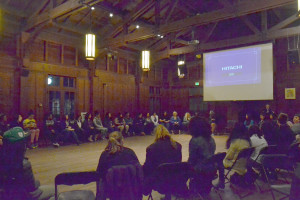
Alum Sonj Basha led the first in a series of social justice oriented presentations for students.
On Jan. 17, the Diversity and Social Justice Resource Center (The Center) sponsored the first in a series of interactive social justice leadership events with Mills students, faculty and members of the community in the student union.
The MC of the interactive kickoff was Sonj Basha, recent Mills alum, activist and artist. Basha guided the different activities for the workshop, which intended to make everyone step out of their comfort zone and connect with people in the room.
“So many experiences I had on Mills’ campus were just microcosms of what I saw amplified beyond these walls,” Basha, who prefers the pronouns they/them, said.
Basha went on to declare the room a brave space, which they defined as “a place where we can relax and fully express without being made to feel unwelcome or unsafe on account of biological sex, race or ethnicity, gender identity or expression, cultural background, age, physical or mental ability, and how we can make a space where self-respect and dignity strongly encourage us to respect other people.”
The first movement of the night was for the audience to arrange all the chairs into a giant circle in the middle of the room. Everyone then partnered up and talked, uninterrupted, to the person next to them for a minute about things that they are sick and tired of hearing about and things they didn’t want to hear about because it makes them feel uncomfortable. Answers tended to be social justice oriented but could also be about anything in their daily lives.
After the presentation, everyone walked around the middle of the room as Basha narrated a role-play of someone being on a work break in downtown San Francisco, to make the tone of the room more rushed and hurried. Basha asked the audience to recognize everyone as they were walking by. The audience was then directed to stop and turn to the person nearest to them and make direct eye contact with them. Basha told the audience that the person they looked in the eye was a catalyst for world change.
This scenario repeated several times throughout the night, and the room felt more loving and accepting as the final round of eye contact came. Basha noted that by the time everyone was told to stand up in the center for the last time, they all went in closer, leaving no empty spaces, compared to the first time.
The final event came with reflection of the night when everyone went around the giant circle and said one word about what they felt after that activity. Empowering, loving, and open were a few of the words shared by the audience.
The Center will host three more workshops before the final social justice summit in March that will bring keynote speakers from New York.
Stay tuned for more articles on this series by The Campanil.
